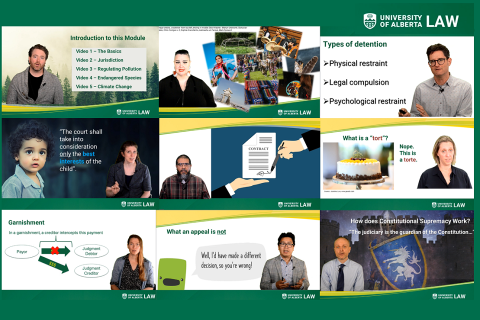Law 101 introduces curious undergrads to Canadian law
Caitlin Crawshaw - 13 February 2023

This winter, the Faculty of Law launched its first introductory for-credit course designed for undergraduates in other faculties.
According to the Faculty’s Vice Dean James Muir, Law 101 is meant to introduce undergraduate students in any program to both law faculty members and the field of law itself.
“A lot of students, regardless of their program, wonder if law is a good career path or a good subject for them,” he says. “Sometimes because they want to become lawyers themselves, but sometimes because they think a law degree will help them in another profession.”
The permanent course is offered online asynchronously, allowing students to complete the 13 modules at their own pace over the course of a term. And since all of the required readings are available online at no cost, Law 101 is a Zero Textbook Cost course, making it more affordable for students.
Course designer and instructor Anna Priemaza, ‘10 LLB, explains that Law 101 is divided into five parts, with the first providing core knowledge about the Canadian legal system, specifically the creation of laws, the constitution and the justice system. The other four parts take a closer look at different areas of law, specifically: Indigenous legal traditions, rights and the law (including the Charter of Rights and Freedoms), personal or private law (such as family law, torts and contracts) and global law (namely environmental and human rights law).
“I would call it a sampler course,” says Priemaza, who was an active lawyer for nine years before transitioning to academic teaching. “You’re not going to get a full breadth of knowledge in a one-week module, but it’ll give you a good sense of what each area is like.”
She continues:
“For instance, in the module about tort law — which concerns wrongdoing against another person — students are introduced to the concept and a few specific torts. You’re not learning about the whole area of tort law, but you’ll learn about negligence and vicarious liability, for instance.”
As the course instructor, Priemaza guides students through the course, marks assignments and exams, and lectures on one of her own areas of expertise, family law. But 12 other professors in the Faculty of Law also contribute to the course content by way of 65 scripted lectures recorded for the class during 2022. This format also gives students a sense of what the Faculty is all about, says Muir:
“We wanted students to be able to meet a broad range of our faculty members, each speaking on subjects on which they are experts.”
The winter term is well underway, but the course will be offered in Spring term as well.
Priemaza hopes all students who complete the course will come away with a grounding in Canadian law, as well as a better sense of what being a lawyer entails and the scope of the profession.
“When a lot of people think of law they picture criminal lawyers,” she says. “This course gives you exposure to so many areas of the law that if you don’t like one module, there’ll be another one that excites you. One of the most amazing things about law is that it is such a broad field and you don’t have to do just that one thing.”